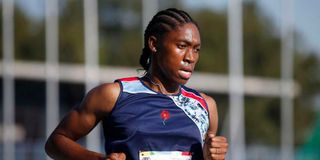Stripped of dignity: Semenya’s ordeal in race for gender identity

South African middle-distance runner and 2016 Olympic gold medallist Caster Semenya competes in the women's 5000m final during the Sizwe Medical Fund Athletics South Africa Senior Track and Field Championships held at the Tuks Athletics Stadium in Pretoria on April 15, 2021.
What you need to know:
- The athlete was unbeaten for almost four years and as her talent showed no sign of fading, international attention was maliciously turned to her physique.
- Instead of focusing on her track achievements, false publications dominated by racist undertones were persistently implanted by unscrupulous organisations.
Black women have for centuries been objectified and treated as spectacles, with every part of their anatomy, including their musculature and facial features, openly derided and insulted.
Icons like Michelle Obama, Oprah Winfrey and Serena Williams have been demeaned by the mainstream media and society, labelled monkeys, accused of being men, and their curves ridiculed.
South Africa’s Mokgadi Caster Semenya is one of the greatest middle-distance track athletes to ever grace the 800-metre race.
Since her professional debut in 2009, she has won two Olympic gold medals, in London 2012 and Rio 2016; three world championships; and dozens of Diamond League meets.
She was unbeaten for almost four years and as her talent showed no sign of fading, international attention was maliciously turned to her physique.
Instead of focusing on her historic achievements on the track, false publications dominated by racist undertones were persistently implanted by unscrupulous athletics organisations.
Also read: Of manly women and Caster Semenya
These institutions considered anything that did not conform to their lily-white Eurocentric version of femininity, as ineligible.
Caster has definite muscles and her voice is deep. She was born with what is medically referred to as a difference in sex development, a term for varying genetic conditions, where an embryo responds in a different way to the hormones that spark the development of internal and external sexual organs.
In layman's terms, she is a woman but without the entire internal female reproductive organs. She, therefore, does not menstruate and her body produces an elevated amount of testosterone.
Contrary to how she's been maligned in the media, she doesn't produce sperm.
Caster did not know any of the internal features about her body until August 19, 2009, when she won a gold medal in the 800-metre race at the World Athletics Championships in Berlin, Germany. She was only 18 and had been subjected to degrading and humiliating gender confirmation tests without her consent, prior to the race.
Caster was born on January 7, 1991, to Pedi parents, Dorcas and Jacob Semenya, in Ga-Masehlong, a sleepy village 60 kilometres from Polokwane, the capital of Limpopo province. It is South Africa's most impoverished place, situated in the northernmost part of the country.
Also read: IAAF now brings in new transgender rules
She was the fourth child in a family of seven and was an early walker, taking her first steps at seven months.
At the age of two, she could outrun all her family members and by the age of six, she viciously fought schoolboys who mocked her, as she developed a strong dislike for bullies.
In her memoir, The Race to Be Myself, she affirms that she has never tolerated bullying.
Growing up in Limpopo, she hunted springboks and warthogs, beat up boys who insulted her sisters and as she grew older, that self-defence continued into her adult life.
When Athletics South Africa scouted Caster, the most dominant 800-metre athlete at the time was Kenya's Pamela Jelimo. She had won Olympic gold in Beijing 2008 and $1 million in the golden league circuit.
Another Kenyan star was Janeth Jepkosgei, who had won gold in the World Athletics Championships in Osaka, Japan, in 2007. Caster was determined to dethrone both.
Also read: Who is Caster Semenya?
After she won gold in the Commonwealth Youth Games in New Delhi, India, Caster got a scholarship, facilitated by legendary South African athletics trainer Michael Seme.
In early February 2009, a month after she turned 18, Caster began studying sports science at the University of Pretoria’s High Performance Centre.
On August 14, 2009, the day before Caster was scheduled to fly to her first major international competition, in the World Athletics Championships in Berlin, she was summoned to a gynaecologist’s office at the university.
She was told that it was a routine doping test for performance enhancing drugs and was forced to strip naked.
Her legs were splayed out as the gynaecologist examined her private parts. She felt immensely violated. Doping tests are conducted using syringes and plastic cups used to draw blood and urine.
Caster knew this ploy was a result of a directive by International Amateur Athletics Federation general secretary Pierre Weiss, influenced by unscrupulous media publications that resulted from the ancient narrative that are consistent with the theme that black women are comparable to men.
The narrative was inflicted by slavery and colonialism but has inherently been instilled by black men who were brainwashed by white supremacy to subjugate their own women.
The widespread media reports falsely claimed Caster was a man who had both male and female reproductive organs.
The gynaecologist didn't find any male reproductive organs during the observation.
In 2019, the International Association of Athletics Federation banned Caster from competing.
In July 2023, she won her discrimination case in the European Court of Human Rights but was ironically still prevented from competing.
The European Court ruled that the 2019 IAAF regulations, perpetuated arbitrary scrutiny of women’s bodies in degrading and invasive ways.
The writer is a novelist, Big Brother Africa 2 Kenyan representative and founder of Jeff's Fitness Centre (@jeffbigbrother).





